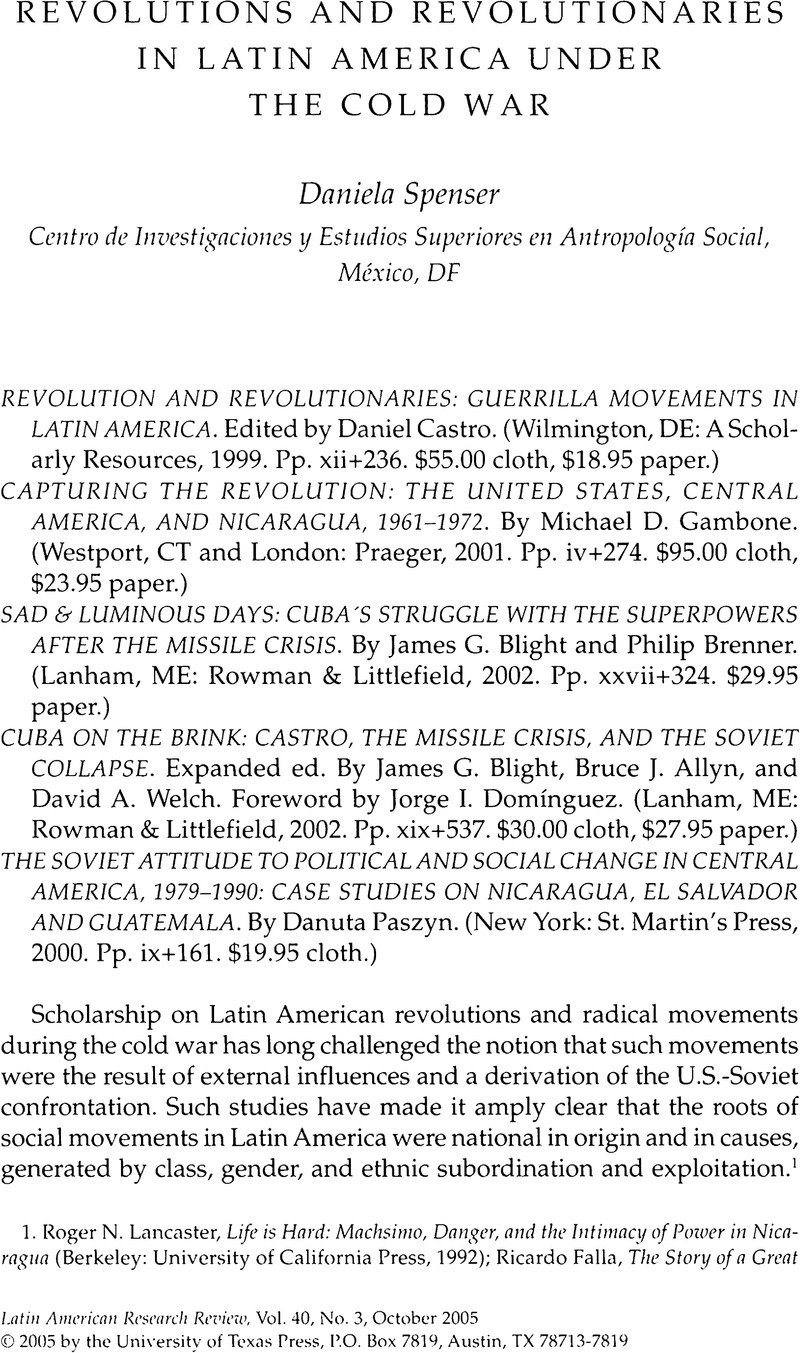Article contents
Revolutions and Revolutionaries in Latin America Under the Cold War
Review products
Published online by Cambridge University Press: 05 October 2022
Abstract

- Type
- Review Essays
- Information
- Copyright
- Copyright © 2005 by the University of Texas Press
References
1. Roger N. Lancaster, Life is Hard: Machsimo, Danger, and the Intimacy of Power in Nicaragua (Berkeley: University of California Press, 1992); Ricardo Falla, The Story of a Great Love: Life with the Guatemalan “Communities of Population in Resistance” (Washington, DC: EPICA, 1998); Deborah Levenson-Estrada, Trade Unionists Against Terror: Guatemala City, 1954–1985 (Chapel Hill: University of North Carolina Press, 1994); Daniel Wilkinson, Silence on the Mountain: Stories of Terror, Betrayal, and Forgetting in Guatemala (Boston: Houghton Mifflin, 2002); Steve Stern, ed., Shilling and Other Paths: War and Society in Peru, 1980–1995 (Durham: Duke University Press, 1998); Orin Starn, Nightwatch: The Politics of Protest in the Andes (Durham: Duke University Press, 1999); Daniel James, Doña María's: Life History, Memory, and Political Identity (Durham: Duke University Press, 2000; Peter Winn, Weavers of Revolution: The Yarur Workers and Chile's Road to Socialism (New York: Oxford University Press, 1986); Rosa Isolde Reuque Paillef, When a Flower is Reborn: The Life and Times of a Mapuche Femininst, ed. Florencia E. Mallon (Durham: Duke University Press, 2002); Heidi Tinsman, Partners in Conflict: The Politics of Gender, Sexuality, and Labor in the Chilean Agrarian Reform, 1950–1973 (Durham: Duke University Press, 2002); Lynn Stephen, Zapata Lives!: Histories and Cultural Politics in Southern Mexico (Berkeley: University of California Press, 2002).
2. Richard Saull, Rethinking Theory and History of the Cold War: The State, Military Power and Social Revolution (London: Frank Cass, 2001).
3. Tony Smith, “New Bottles for New Wine: A Pericentric Framework for the Study of the Cold War,” Diplomatic History 24 (4): 567–91 (Fall 2000).
4. Héctor Béjar, Peru 1965: Notes on a Guerrilla Experience, (New York: Monthly Review Press, 1970).
5. Stephen G. Rabe, The Most Dangerous Area in the World: John F. Kennedy Confronts Communist Revolution in Latin America (Chapel Hill and London: The University of North Carolina Press, 1999).
6. Jorge I. Domínguez, “Foreword,” to Cuba on the Brink, ix.
7. See Aleksandr Fursenko and Timothy Naftali, “One Hell of a Gamble:” Khrushchev, Castro, and Kennedy, 1958–1964 (New York and London: W. W. Norton, 1997).
8. William Taubman, Khrushchev: The Man and his Era (New York: W.W. Norton, 2003).
9. Richard Saull, Rethinking Theory and History in the Cold War. The State, Military Power and Social Revolution (London: Frank Cass, 2001).
10. Lora Soroka, comp., Forni 89. Communist Party of the Soviet Union on Trial (Stanford, California: Hoover Institution Press, 2001), 266–365.
11. Teddy J. Uldricks, Diplomacy and Ideology: The Origins of Soviet Foreign Policy (London and Beverly Hills, Sage Publications, 1979).
12. Cited in Jacques Lévesque, The USSR and the Cuban Revolution. Soviet Ideological and Strategical Perspectives, 1959–77 (New York and London, Praeger, 1978), 148.
13. For the elaboration of this concept, see Vladimir Zubok and Constantine Pleshakov, inside the Kremlin's Cold War: From Stalin to Khrushchev (Cambridge, MA: Harvard University Press, 1996).
- 1
- Cited by


